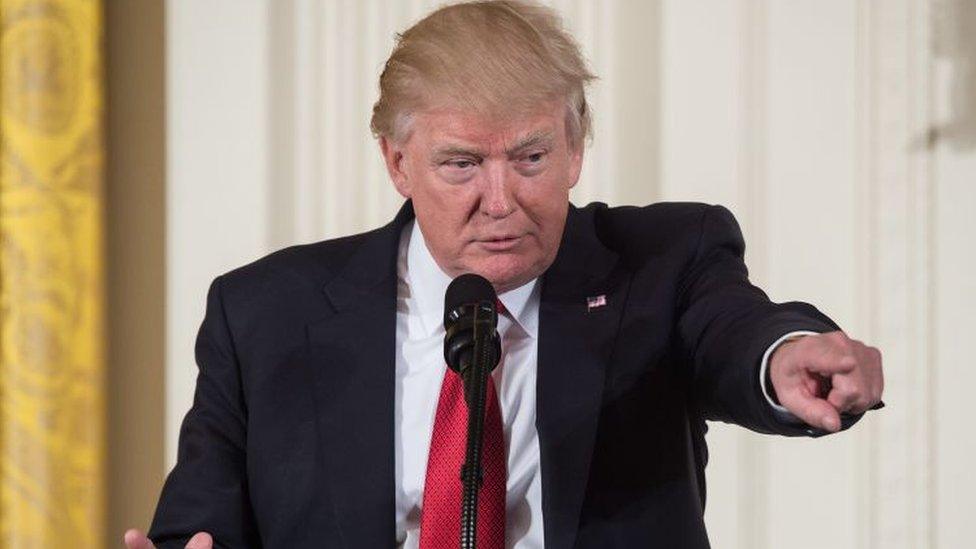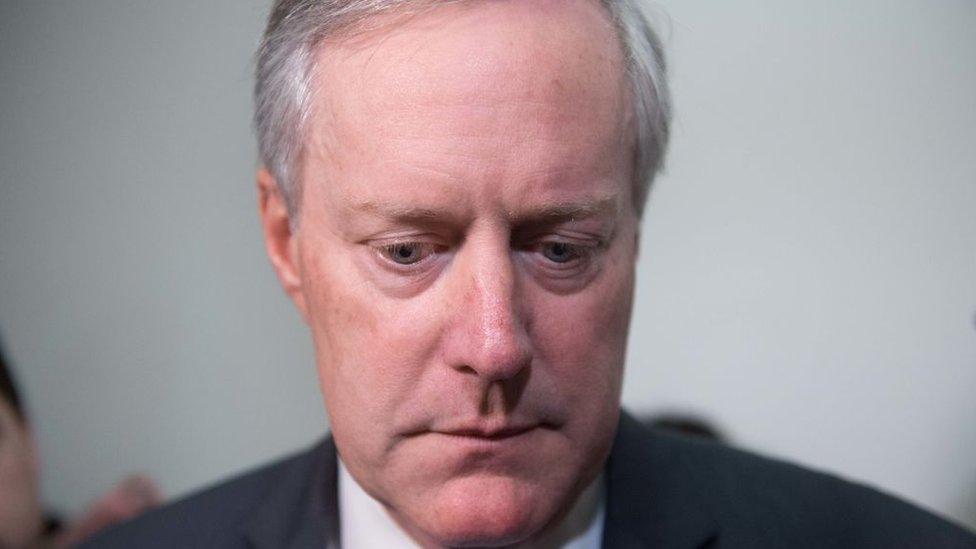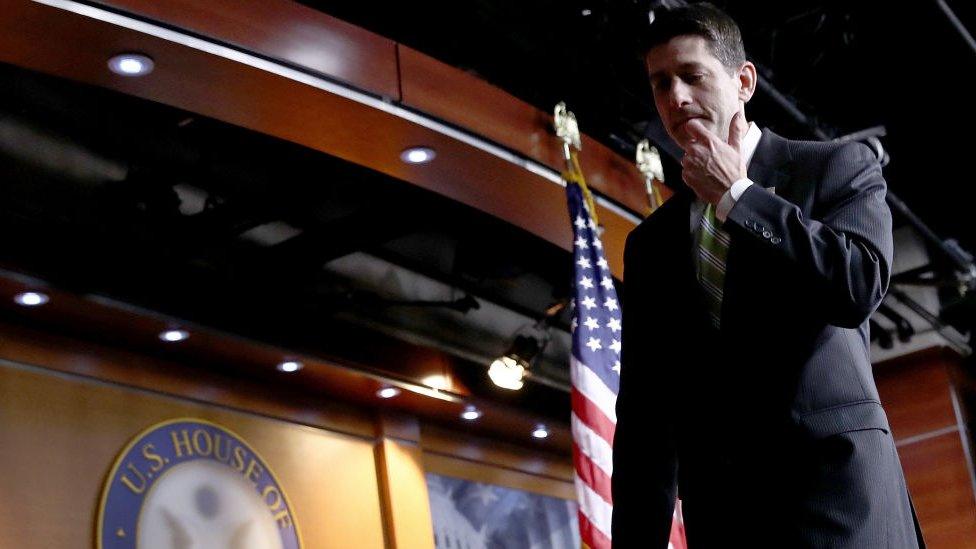Trump declares war on party rebels
- Published

Last week Donald Trump said he was going to "come after" congressman Mark Meadows, the head of the House Freedom Caucus, if he didn't support the American Health Care Act. White House Press Secretary Sean Spicer later said the president was joking.
No one is laughing now.
The House Freedom Caucus, the collection of libertarian-leaning conservatives who helped sink the Trump-backed American Health Care Act last week, appears to be as much of a political enemy for the president as the Democratic Party.
"The Freedom Caucus will hurt the entire Republican agenda if they don't get on the team, & fast," Mr Trump tweeted, external on Thursday morning. "We must fight them, & Dems, in 2018!"
The tweet was the latest, most pointed, shot at the Freedom Caucus since the healthcare bill collapsed last Friday. In his initial remarks that afternoon, after the bill was unceremoniously pulled from consideration in the midst of being debated in the House, Mr Trump placed the blame squarely on the Democrats.
"We had no votes from the Democrats," the president lamented. "They weren't going to give us a single vote, so it's a very difficult thing to do."
He also said he had no hard feelings toward the Freedom Caucus, who he described as "friends of mine".

Congressman Mark Meadows and the rest of the House Freedom Caucus are feeling the heat from the president
Over the past week, however, his attitude has shifted.
On Sunday the president tweeted, external that the Freedom Caucus, along with several grass-roots conservative groups, had "saved" Obamacare and the women's health group Planned Parenthood, whose clinics provide abortion services.
The next day he wrote, external the Freedom Caucus "was able to snatch defeat from the jaws of victory".
Now it appears the president is preparing for all-out war against the intransigent congressmen - and it's a fight they seem willing to join. Shortly after Mr Trump fired his Thursday morning broadside, Justin Amash, a prominent member of the Freedom Caucus, offered his reply.
"It didn't take long for the swamp to drain Donald Trump," he tweeted, external. "No shame, Mr President. Almost everyone succumbs to the DC Establishment."
The fissures appearing beneath Mr Trump's feet as he tries to lead the Republican Party are not new, of course. Speaker of the House John Boehner, who was the top Republican officeholder during much of Barack Obama's presidency, constantly grappled with rebellious House members right up until he was forced from the speakership in September 2015.
For the first two months of the Trump presidency, however, it seemed like Republicans - finally in control of all the levers of power in Washington - might be able to present a unified front in advancing an ambitious agenda that included healthcare and tax reform, sweeping cuts in discretionary government programmes, and boosts in military and infrastructure spending.
Last week's healthcare fiasco has cast all of that into doubt, with a president unmoored from his own party sending out a number of conflicting messages.
After lambasting Democrats last Friday, Mr Trump has made several overtures to the opposition party. On Monday he tweeted the Democrats will be ready to deal once "Obamacare folds".

Paul Ryan doesn't want Donald Trump working with Democrats on healthcare
"Do not worry," he wrote, "we are in very good shape."
The following night he told a bipartisan gathering of senators on Tuesday night that both Democrats and Republicans want to fulfil promises to improve American healthcare.
"I know that we're all going to make a deal on healthcare," he said. "That's such an easy one."
This set off its own series of tremors in Washington politics. On Wednesday evening Speaker Ryan was asked what he thought of Mr Trump reaching out to Democrats on healthcare reform.
"I don't want that to happen," he said. "You know why? I want a patient-centred system. I don't want government running healthcare.
"The government shouldn't tell you what you must do with your life, with your healthcare. We should give people choices."
On Thursday morning Bob Corker, a Republican senator from Tennessee, gave the speaker a stinging rebuke.
"We have come a long way in our country when the speaker of one party urges a president NOT to work with the other party to solve a problem," he tweeted, external.
A case can be made for a presidential political strategy that attempts to play House Freedom Caucus hard-liners off against Democrats to bring either one group or the other into a governing majority in Congress.
If that's the case, however, Mr Trump's strategy of antagonising both groups, 140 characters at a time, seems an uncertain way of realising that goal.
Traditional partisan battle lines may at least temporarily re-emerge next week, when the Senate votes on seating Neil Gorsuch to the Supreme Court.
But the fractures in the Republican party will probably once again become apparent with upcoming political fights over the budget, taxes and - perhaps - healthcare once again.
Over the course of the 2016 presidential campaign, Trump voters time and time again said they were supporting their candidate because they wanted to disrupt the political order in Washington and get things done.
While the latter is still very much in doubt, the former is looking more and more like a mission accomplished.